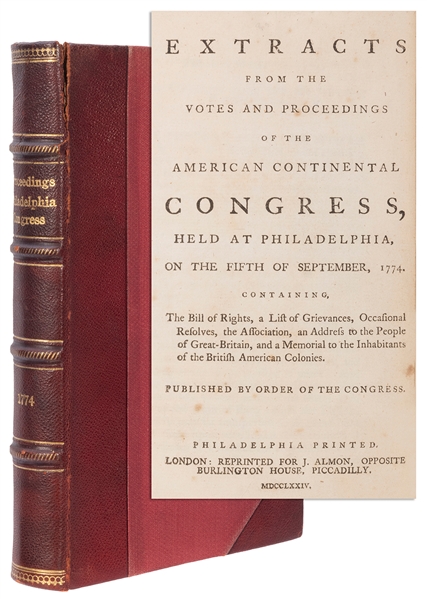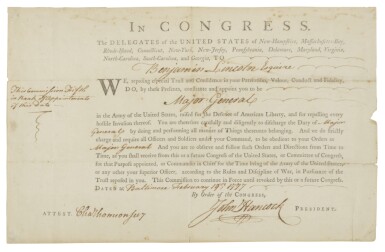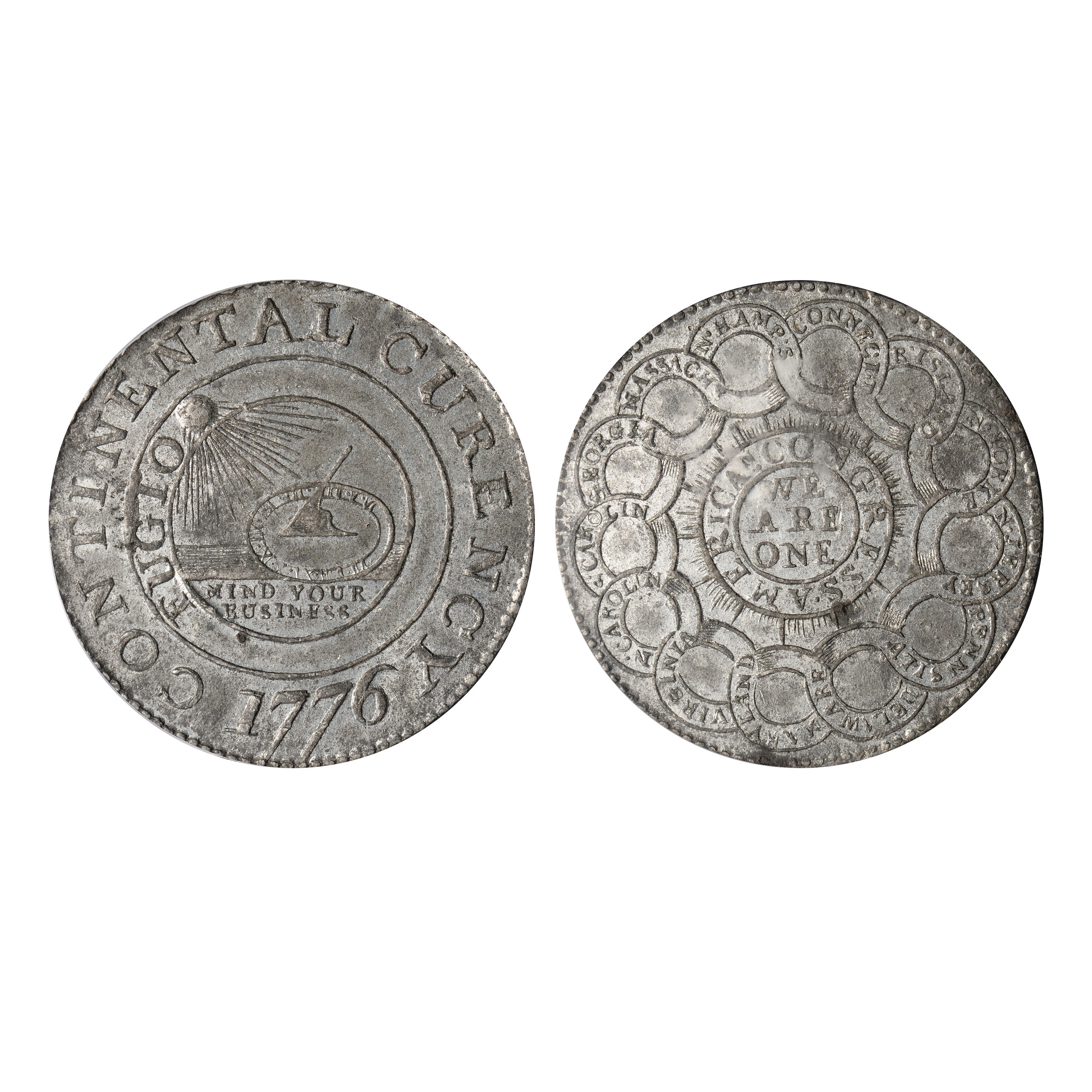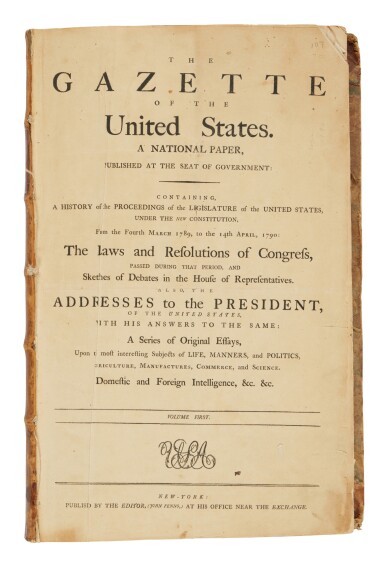Continental CongressThe Twelve United Colonies, by their Delegates in Congress, to the Inhabitants of Great-Britain. [Philadelphia: Printed by William and Thomas Bradford, 1775]
8vo, 4 leaves (173 x 108). Caption-title, numbered "8" in manuscript at head of first page; lightly browned, some marginal spotting especially at top margin of last page. Evidently disbound from a contemporary pamphlet Sammelband.
First printing of a significant Congressional companion to the Olive Branch Petition, addressed not to George III but to the people of Great Britain, who are saluted as "Friends, Countrymen, and Brethren!" Largely the work of Virginia delegate Richard Henry Lee (joined by New York's Robert R. Livingston Jr. and Virginia's Edmund Pendleton), this address was issued the same day the Congress signed and dispatched the Olive Branch Petition. The text here is dated at the end "Philadelphia, July 8, 1775" and, like the first printing of the Declaration of Independence issued just shy of a year later, it is signed in type by John Hancock as president of Congress, and attested by Charles Thomson Since Georgia had only one delegate, Lyman Hall, in attendance until late August, this appeal was sent under the auspices of just twelve of the thirteen American colonies.
While the Olive Branch Petition, written by a committee headed by John Dickinson, was a sincere effort to reconcile with the mother country, the purpose of Lee's address may have been to provide "plausible deniability" for the coming war. This letter "to the Inhabitants of Great-Britain" was issued, after all, just two days after the Congress promulgated its declaration setting forth the causes and necessity of the United Colonies taking up arms. Still, the more conservative elements in Congress, intent on finding a peaceful resolution with Great Britain, may have hoped for a sympathetic hearing by the strong minority of the English public that was supportive of the rights of the colonies.
But by the time this address was adopted, the battles of Lexington and Concord (19 April) and Bunker Hill (17 June) had already taken place. Lee's text begins by stating that the North American colonists have been "reduced to the melancholy Alternative of renouncing your Favour or our Freedom," and continues to enumerate an exhaustive litany of wrongs perpetrated by the government of George III: the roster of Parliamentary legislation that came to be known as the "Intolerable Acts"; Boston being "now garrisoned by an Army sent not to protect, but to enslave its Inhabitants"; "the wanton and unnecessary Destruction of Charlestown"; the denial of the "fundamental Principle of the British Constitution, that every Man should have at least a Representative Share in the Formation of those Laws, by which he is bound"; and cabinet ministers who act as "equal Foes to British and American freedom" and "exhaust your Treasures and waste the Blood of your Countrymen in vain Attempts on our Liberty. …"
That this letter to the British people from the Continental Congress seems intended at least as much to provoke a crisis as to avoid it should not be surprising: a year later, 7 June 1776, its principal author, Richard Henry Lee, moved the resolution in the Continental Congress "That these United Colonies are, and of right ought to be, free and independent States, that they are absolved from all allegiance to the British Crown, and that all political connection between them and the State of Great Britain is, and ought to be, totally dissolved."
The congressional address "to the Inhabitants of Great-Britain" was quickly reprinted, in both pamphlet and broadside format, by Daniel Fowle in Portsmouth, John Holt in New York, Solomon Southwick in Newport, and the Bradfords themselves; it also appeared in several newspapers, including Rivington's New-York Gazetteer. All 1775 printings are uncommon and the present first printing is rare: Rare Book Hub cites a single copy at auction, Sotheby's London, 3 July 1967, lot 108A.
REFERENCE:Evans 14532; ESTC W29610; Hildeburn 3302; Sabin 97533. Not in Adams, Independence; cf. Adams, Controversy 75-152
Continental CongressThe Twelve United Colonies, by their Delegates in Congress, to the Inhabitants of Great-Britain. [Philadelphia: Printed by William and Thomas Bradford, 1775]
8vo, 4 leaves (173 x 108). Caption-title, numbered "8" in manuscript at head of first page; lightly browned, some marginal spotting especially at top margin of last page. Evidently disbound from a contemporary pamphlet Sammelband.
First printing of a significant Congressional companion to the Olive Branch Petition, addressed not to George III but to the people of Great Britain, who are saluted as "Friends, Countrymen, and Brethren!" Largely the work of Virginia delegate Richard Henry Lee (joined by New York's Robert R. Livingston Jr. and Virginia's Edmund Pendleton), this address was issued the same day the Congress signed and dispatched the Olive Branch Petition. The text here is dated at the end "Philadelphia, July 8, 1775" and, like the first printing of the Declaration of Independence issued just shy of a year later, it is signed in type by John Hancock as president of Congress, and attested by Charles Thomson Since Georgia had only one delegate, Lyman Hall, in attendance until late August, this appeal was sent under the auspices of just twelve of the thirteen American colonies.
While the Olive Branch Petition, written by a committee headed by John Dickinson, was a sincere effort to reconcile with the mother country, the purpose of Lee's address may have been to provide "plausible deniability" for the coming war. This letter "to the Inhabitants of Great-Britain" was issued, after all, just two days after the Congress promulgated its declaration setting forth the causes and necessity of the United Colonies taking up arms. Still, the more conservative elements in Congress, intent on finding a peaceful resolution with Great Britain, may have hoped for a sympathetic hearing by the strong minority of the English public that was supportive of the rights of the colonies.
But by the time this address was adopted, the battles of Lexington and Concord (19 April) and Bunker Hill (17 June) had already taken place. Lee's text begins by stating that the North American colonists have been "reduced to the melancholy Alternative of renouncing your Favour or our Freedom," and continues to enumerate an exhaustive litany of wrongs perpetrated by the government of George III: the roster of Parliamentary legislation that came to be known as the "Intolerable Acts"; Boston being "now garrisoned by an Army sent not to protect, but to enslave its Inhabitants"; "the wanton and unnecessary Destruction of Charlestown"; the denial of the "fundamental Principle of the British Constitution, that every Man should have at least a Representative Share in the Formation of those Laws, by which he is bound"; and cabinet ministers who act as "equal Foes to British and American freedom" and "exhaust your Treasures and waste the Blood of your Countrymen in vain Attempts on our Liberty. …"
That this letter to the British people from the Continental Congress seems intended at least as much to provoke a crisis as to avoid it should not be surprising: a year later, 7 June 1776, its principal author, Richard Henry Lee, moved the resolution in the Continental Congress "That these United Colonies are, and of right ought to be, free and independent States, that they are absolved from all allegiance to the British Crown, and that all political connection between them and the State of Great Britain is, and ought to be, totally dissolved."
The congressional address "to the Inhabitants of Great-Britain" was quickly reprinted, in both pamphlet and broadside format, by Daniel Fowle in Portsmouth, John Holt in New York, Solomon Southwick in Newport, and the Bradfords themselves; it also appeared in several newspapers, including Rivington's New-York Gazetteer. All 1775 printings are uncommon and the present first printing is rare: Rare Book Hub cites a single copy at auction, Sotheby's London, 3 July 1967, lot 108A.
REFERENCE:Evans 14532; ESTC W29610; Hildeburn 3302; Sabin 97533. Not in Adams, Independence; cf. Adams, Controversy 75-152















Testen Sie LotSearch und seine Premium-Features 7 Tage - ohne Kosten!
Lassen Sie sich automatisch über neue Objekte in kommenden Auktionen benachrichtigen.
Suchauftrag anlegen